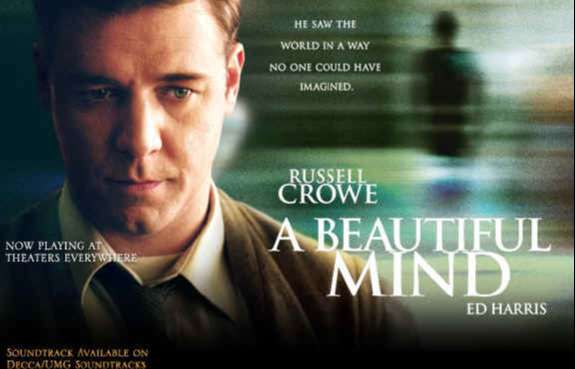”A Beautiful Mind (2001)”

Review of A Beautiful Mind (2001)
General Information
- Director: Ron Howard
- Main Cast:
- Russell Crowe (John Nash)
- Jennifer Connelly (Alicia Nash)
- Ed Harris (Parcher)
- Christopher Plummer (Dr. Rosen)
- Paul Bettany (Charles Herman)
- Adam Goldberg (Sol)
- Genre: Biography, Drama
- Runtime: 135 minutes
Plot
A Beautiful Mind is based on the true story of John Nash, a brilliant but troubled mathematician who won the Nobel Prize in Economic Sciences in 1994. The film follows Nash’s early years at Princeton University, where he develops a groundbreaking theory in mathematics, while simultaneously struggling with paranoid schizophrenia. As Nash’s mental health deteriorates, he begins to see and interact with people who aren’t there, including his best friend Charles and a mysterious government agent, Parcher. Despite his difficulties, Nash’s wife, Alicia (Jennifer Connelly), remains by his side, supporting him through his challenges as he fights to regain control of his life and career. The film explores Nash’s journey through his struggles with mental illness, love, and the pursuit of personal and professional redemption.
Highlights
- Russell Crowe’s Performance
- Russell Crowe delivers an extraordinary, Oscar-nominated performance as John Nash. Crowe brilliantly captures the complexities of Nash’s character, conveying both his genius and his vulnerability. His portrayal of a man battling with the distortions of his mind is both heartbreaking and inspiring, anchoring the film’s emotional depth. Crowe’s nuanced performance brings authenticity to Nash’s inner turmoil, making his struggles with mental illness deeply relatable to the audience.
- Jennifer Connelly’s Portrayal of Alicia Nash
- Jennifer Connelly gives a moving performance as Alicia Nash, John’s wife. Alicia is not just a supportive figure, but a complex character who balances her love and devotion to John with the reality of his illness. Connelly’s portrayal brings warmth and strength to the role, and her character’s journey is one of the most poignant aspects of the film, as she experiences her own challenges in supporting John through his breakdowns and recovery.
- Exploration of Mental Illness
- A Beautiful Mind sensitively and intelligently addresses mental illness, particularly schizophrenia. The film highlights the confusion and isolation that comes with the disorder, as well as the profound impact it has on relationships and personal identity. The portrayal of Nash’s delusions is immersive, allowing the audience to experience, to some degree, what it might be like to live with the condition.
- Direction and Cinematography
- Ron Howard’s direction is intimate and focused, allowing the story to unfold at a deliberate pace. The cinematography complements the narrative, often using visual cues to convey Nash’s perceptions of reality, such as shifting perspectives and the use of shadows to represent his delusions. The film’s subtle use of visual effects helps to blur the lines between Nash’s real and imagined experiences, creating a sense of disorientation that mirrors his internal struggles.
- Emotional Impact and Storytelling
- The film’s emotional core is its exploration of perseverance and love. The relationship between John and Alicia Nash serves as the heart of the story, and their bond, despite the challenges they face, is portrayed in a way that resonates deeply. The film balances personal and professional milestones, showing Nash’s intellectual achievements alongside the toll that his illness takes on him and his family. The resolution of Nash’s story—his eventual recognition with the Nobel Prize—feels earned and deeply satisfying.
- Musical Score by James Horner
- James Horner’s score for A Beautiful Mind is both uplifting and somber, underscoring the emotional journey of the characters. The music complements the film’s themes of genius and struggle, elevating the overall experience and adding to the emotional resonance of key scenes.

- James Horner’s score for A Beautiful Mind is both uplifting and somber, underscoring the emotional journey of the characters. The music complements the film’s themes of genius and struggle, elevating the overall experience and adding to the emotional resonance of key scenes.
Criticisms
- Creative Liberties and Simplification
- While A Beautiful Mind is based on the true story of John Nash, it takes creative liberties with some aspects of Nash’s life and struggles, particularly in terms of his mental illness. Some critics have pointed out that the film simplifies or alters certain elements for dramatic effect, such as the depiction of Nash’s hallucinations and the omission of important people in his life. For some, these changes may detract from the film’s factual accuracy.
- Pacing Issues
- The film’s pacing can feel slow at times, especially in the first half as it sets up Nash’s early academic achievements and the onset of his mental illness. While the character development is essential, the early scenes may feel a bit drawn out before the plot gains momentum.

- The film’s pacing can feel slow at times, especially in the first half as it sets up Nash’s early academic achievements and the onset of his mental illness. While the character development is essential, the early scenes may feel a bit drawn out before the plot gains momentum.
Verdict
A Beautiful Mind is a compelling and emotionally charged biographical drama that explores the triumphs and tribulations of a brilliant mathematician’s battle with schizophrenia. Russell Crowe’s powerful performance and the film’s sensitive portrayal of mental illness make it a standout, offering a heartwarming story of perseverance, love, and redemption. While it takes some creative liberties with the true story, the film succeeds in telling an inspiring and moving narrative that will leave a lasting emotional impact on viewers.
Rating: 9/10











